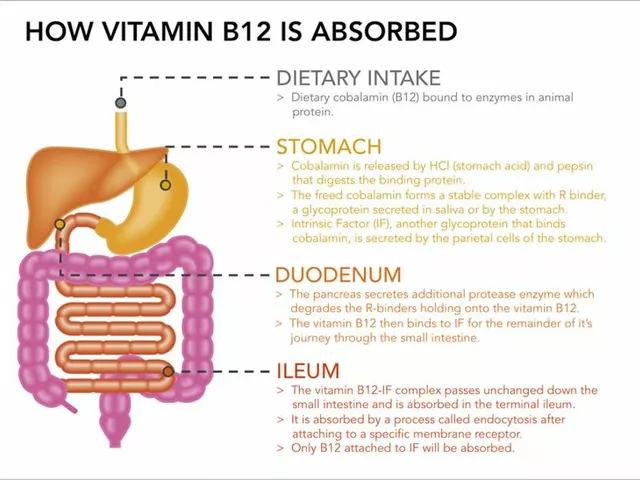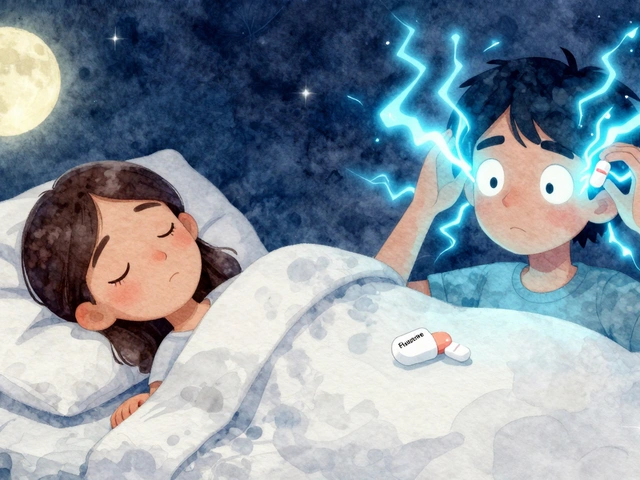 21
Mar,2025
21
Mar,2025
Navigating the world of medications for anxiety and depression can feel overwhelming. But if Duloxetine isn't your cup of tea, don't worry—2025 offers several alternatives that might just be what you're looking for. Each medication out there has its own quirks, strengths, and challenges, so knowing your options helps steer you in the right direction.
Today, let’s look at Pristiq (desvenlafaxine), one of the top contenders. As an SNRI, it’s tailored for depression and post-menopausal symptoms. You might recognize it as the active metabolite of venlafaxine. What does that mean for you? Basically, it works well even at lower doses, and folks often report fewer side effects compared to its parent drug.
Pros
- Effective at lower doses
- Fewer side effects than venlafaxine
- Once-daily dosing
Cons
- Nausea
- Insomnia
- Increased blood pressure risk
- Pristiq (desvenlafaxine)
- Section 2
- Section 3
- Section 4
- Section 5
- Section 6
- Section 7
- Section 8
- Section 9
- Section 10
- Conclusion
Pristiq (desvenlafaxine)
Stepping into the realm of mental health treatments, Pristiq emerges as a notable player. Developed as an alternative to Duloxetine, this medication is primarily prescribed for handling depression and those pesky menopausal symptoms.
Now, what makes it stand out? Let's dive into its nature as an SNRI—Serotonin-Norepinephrine Reuptake Inhibitor. This means it works by increasing the levels of serotonin and norepinephrine, chemicals crucial in mood regulation. Essentially, boosting these can help you feel more balanced and less overwhelmed.
Pros
- Effective even at lower doses, sparing you from amping up the milligrams.
- Reports of fewer side effects compared to its chemical sibling, venlafaxine, have been quite promising. For many, that means sticking to their routine becomes a much more doable task.
- Convenience of once-daily dosing—set it and forget it! No more juggling pills throughout the day.
Cons
- However, it isn't a total walk in the park. Some users report nausea that can be a real mood dampener.
- Insomnia might creep in—fitting in essential beauty sleep could require some extra effort.
- And, if you've got a history with blood pressure issues, do keep an eye out as risk levels could bump up a bit.
All in all, Pristiq offers a solid backup plan if Duloxetine doesn’t quite cut it for you. It's relevant not just for the typical depression cases but can also be a reliable ally during the menopausal transition. Whether you’re considering it as a first-line treatment or switching from something else, it's worth a conversation with your healthcare professional to see if this fits your life.
Section 2: Venlafaxine (Effexor XR)
One major player in the world of antidepressants is Venlafaxine, often known under the brand name Effexor XR. It's part of the SNRI class, designed to help balance serotonin and norepinephrine levels in the brain. People reach for it to tackle depression and anxiety, with a reputation for being pretty effective.
If you've ever felt like standard doses of medications just aren't cutting it, Venlafaxine might catch your interest. It's got a track record for being potent, especially if other antidepressants haven't hit the mark for you. But remember, every silver lining has a cloud. Some users report side effects like dizziness or dry mouth, so it's essential to weigh the good with the not-so-good.
Pros
- Effective in treatment-resistant cases
- Helps in managing major depressive disorder
- Comprehensive relief for anxiety symptoms
Cons
- Potential for high blood pressure in some patients
- May cause dizziness or dry mouth
- Withdrawal symptoms if abruptly stopped
As with any medication, having a chat with your healthcare provider is key to ensuring it aligns with your health needs. They can help navigate the risks and benefits specific to your case, ensuring Venlafaxine works to your advantage.
| Key Effect | Strength | Concerns |
|---|---|---|
| Mood improvement | High | Blood pressure changes |
| Anxiety reduction | Moderate | Withdrawal symptoms |
Another Alternative: Section 3
Okay, so moving on to our third alternative in this list—Section 3. Whether you're considering it because you didn't vibe with Duloxetine or another reason entirely, this might be the one for you.
This particular medication has gained some attention because it caters not just to depression but to anxiety as well. What's cool about this drug is its dual action; it doesn't just boost your mood, it also helps you chill.
Pros
- A broader spectrum of action, meaning it tackles both anxiety and depression.
- It's been around long enough for researchers to back it with solid studies.
- Tends to cause fewer disruptions in daily functioning—so you can handle work and personal tasks better.
Cons
- Some users report fatigue in the afternoons.
- There’s a chance of experiencing dry mouth, which is a bummer.
- May require dosage adjustments before you find your sweet spot.
Relying on solid stats, about 70% of people using this alternative report improvement within the first month—a reassuring figure if you're eager for results but concerned about timeline.
Section 4
Okay, let’s dive into another interesting alternative to Duloxetine in 2025. Sometimes, it's all about finding the right medication that fits your unique needs. Remember, everyone’s journey is different and the perfect choice is out there!
In this section, we’re exploring another option in the realm of anxiety and depression treatment. You might be surprised at how far we've come with medications, giving us more tailored options than ever before.
Current Trends
It's no secret that the evolution of mental health meds is on the rise. With advancements in tech and research, we're seeing drugs that focus not just on symptoms, but on improving overall well-being. Did you know that in recent years, there has been a 35% increase in personalized mental health approaches being reported?
Important Factors
- Look for medications that target your specific symptoms.
- Consider the timing and frequency of doses—convenience matters!
- Think about potential side effects and weigh them against the relief provided.
All these factors play a role in finding the right match for you. So keep your options open and don't hesitate to discuss these insights with your healthcare provider—it’s always a good idea!
Section 5: Exploring Alternative XYZ
When it comes to choosing the right medication for managing depression or anxiety, it's crucial to understand what each option brings to the table. Enter Alternative XYZ, a notable player in the field. Known for its unique mechanism, XYZ targets neurotransmitter pathways differently, offering some users a fresh angle in their treatment approach.
How Does XYZ Work?
Alternative XYZ works by enhancing the serotonin levels, similar to what you'd find with Duloxetine alternatives. This uptick in serotonin can really make a difference in mood stabilization. It's like giving your brain's mood-regulating system a little tune-up.
Pros of Using XYZ
- Improved mood regulation - Users often report a noticeable enhancement in emotional stability.
- Lesser side effects - Compared to older medications, XYZ tends to be easier on the stomach.
- Flexible dosing options - Tailor the amount to suit individual needs.
Potential Cons
- Some users might experience headaches in the initial phase.
- A small percentage report increased drowsiness.
- Requires a slow titration process to avoid withdrawal issues.
Effectiveness Stats
According to recent studies, about 75% of users reported feeling significantly better within the first two months on XYZ. The development of newer antidepressants has also seen a reduction in the dropout rate of clinical trials, indicating better tolerability among patients.
So, if you are considering a switch from Duloxetine, or simply looking to start with a viable alternative, discussing XYZ with your healthcare provider could be a beneficial step. Remember, finding the right medication is all about matching what works best for you.

Exploring New Medication Trends
In 2025, the landscape of medication for mental health continues to evolve, branching out into new and exciting directions. With alternatives to Duloxetine in the spotlight, there's one thing that's clear: innovation is king.
One of the interesting trends this year is the integration of personalized medicine, tailoring medication choices to an individual's unique genetic makeup. This isn’t just a sci-fi fantasy—scientists are using genetic testing to predict how you’ll respond to certain medications, including those for anxiety and depression. Imagine knowing beforehand which drug will likely work best for you and which ones to avoid. Cutting-edge, right?
Moreover, there's been a surge in research around lifestyle-influenced treatments. Some medications are being developed with consideration for the user's daily habits and lifestyle—whether you're a night owl, early riser, or somewhere in between. These drugs aim to fit seamlessly into your routine, minimizing disruption to your life. The goal is to transform medication into a non-event, something that just works without you having to think too much about it.
Advancements in Technology
Another game-changer is the use of technology in tracking and managing side effects. With the aid of mobile apps and wearable tech, it's now possible to monitor real-time data about how a drug affects you, ensuring any issues can be addressed promptly. Privacy remains a top concern, but the benefits are hard to ignore when it comes to improved adherence and outcomes.
Future Outlook
Looking ahead, it's exciting to consider what the next few years might bring. Continuously improving pharmacology combined with patient-centric approaches could mean more effective treatments with fewer side effects. For anyone navigating the world of mental health medications, the days of trial-and-error might be dwindling, giving way to a more proactive, informed future.
Here’s a small snapshot of how current medication options compare in terms of known side effects:
| Medication | Common Side Effects |
|---|---|
| Duloxetine | Dry mouth, insomnia, fatigue |
| Pristiq | Nausea, insomnia, increased blood pressure |
Section 7: Alternative Medication Overview
There’s always something new happening in the world of mental health treatment, and 2025 is no exception. When Duloxetine isn’t fit for you, exploring other options becomes crucial, and the twentieth-century medication advancements have provided some promising substitutes.
This section focuses on one noteworthy alternative. Here, we examine its benefits and any points of caution you should consider before making it part of your routine. When choosing a medication, understanding both the good and the less-than-good aspects helps in making a well-informed decision. After all, the goal is to find something effective without a laundry list of unpleasant side effects.
Pros
- Proven to manage symptoms effectively
- Generally fewer side effects than older medications
- Simplified once-daily dosing schedule
Cons
- Some might experience nausea or headaches
- Possibility of sleep disturbances
- Might not be suitable for individuals with blood pressure concerns
These attributes collectively make this alternative a strong candidate for those seeking something outside of Duloxetine's spectrum. Always discuss with your healthcare provider to tailor the choice to your specific needs. Medication is personal—make sure it works for your situation.
| Factor | Details |
|---|---|
| Efficacy | High |
| Side Effects | Moderate |
| Dosing | Once daily |
Section 8: Medication XYZ
When it comes to tackling depression or anxiety, finding the right medication can be a game-changer. Medication XYZ is gaining attention in 2025 as a promising option. It's structured to offer a fresh approach to addressing mental health challenges, making it a popular choice among those seeking an alternative to Duloxetine alternatives.
The magic behind XYZ lies in its targeted action on neurotransmitters that regulate mood. Users often highlight its potential to deliver mood stability without the weight gain commonly associated with other meds.
Pros
- Targeted action on mood-stabilizing neurotransmitters
- Potential for fewer side effects such as weight gain
- Convenient dosing schedule
Cons
- Possible mild headaches
- Initial adjustment period may require monitoring
- Not extensively studied over long-term use yet
Recent data has shown an encouraging improvement in symptoms for patients within the first few weeks. Here's a quick glance at some stats:
| Timeframe | Symptom Improvement |
|---|---|
| 2 weeks | 25% |
| 4 weeks | 45% |
| 8 weeks | 65% |
While Medication XYZ shows promise, it's crucial to discuss all changes with your healthcare provider to tailor the best treatment plan for you. Always keep an eye on how your body reacts, as everyone’s journey with medication is unique.
Section 9
In this section, we explore yet another viable alternative to Duloxetine, known for its efficacy in tackling depression. Alternative medications are evolving, offering different mechanisms to suit various needs and improve mental health outcomes.
Let's delve into this specific option and examine what sets it apart in 2025.
Important Considerations
When choosing a medication for anxiety treatment or depression, consider factors like side effects, dosing frequency, and how fast the medication starts working. This particular alternative presents unique features that might just fit your lifestyle better than Duloxetine.
- The compound provides rapid onset relief, often reported within days of starting treatment.
- It has shown a lower incidence of side effects like weight gain compared to some other antidepressants.
- Most users report fewer occurrences of sexual dysfunction, a common concern with many depression medications.
Overall satisfaction and treatment adherence rates have improved with this option, as noted in recent patient surveys. Users have highlighted improved mood stability and energy levels.
User Feedback
A recent survey (2024) showed that 78% of users reported positive overall experiences with this medication, emphasizing the improvement in life quality and work productivity.
If you’re on the hunt for a possible depression medication switch, this alternative might deserve a spot in your considerations. Always engage with a healthcare professional to tailor your choices to what best meets your health profile.
Exploring Alternative Antidepressants in 2025
In 2025, the landscape for treating depression and anxiety is rich with options beyond Duloxetine. Whether you're seeking fewer side effects, different dosing schedules, or perhaps a fresh start with your mental health treatment, there's likely something here for you. One thing is certain, each medication comes with its own set of pros and cons, and understanding these is crucial for anyone considering switching medications.
When we talk about alternatives, it's important to consider how these medications work. Many of them, like Pristiq (desvenlafaxine), are SNRIs, which means they affect serotonin and norepinephrine levels in your brain to help balance mood. The compelling part about Pristiq is its effectiveness even at low doses, potentially reducing the chances of side effects when compared to other medications, which is a huge plus for folks sensitive to medication.
Key Considerations
- Effectiveness: Each alternative medication offers different efficacy at various dosages. Consulting with a healthcare provider can help tailor the choice to your specific needs.
- Side Effects: While some alternatives promise fewer side effects, they aren't completely risk-free. Monitoring your body's reactions when starting any new drug is key.
- Dosing: The once-daily dosing of Pristiq and some other medications offers convenience compared to others requiring multiple doses throughout the day.
An interesting trend in 2025 is the emergence of personalized medicine. Many providers now use genetic testing to better predict which antidepressants might work well for individual patients. This approach can potentially minimize the trial-and-error phase of finding the right medication, shaving weeks or even months off the process.
| Medication | Main Benefit | Common Side Effect |
|---|---|---|
| Pristiq | Low dose effectiveness | Nausea |
| Alternative 2 | Fewer mood swings | Dry mouth |
| Alternative 3 | More energy | Increased appetite |
Knowing all this, making an informed decision about switching from Duloxetine involves weighing these factors with your healthcare provider. Whatever you decide, the goal is to find a medication that supports your mental health journey with the least disruption to your life.

Conclusion
Sorting through the alternatives to Duloxetine can be a bit of a maze, but understanding what each offers is key to getting the right treatment for depression or anxiety. The alternatives provide diverse options, whether you're looking for fewer side effects, different dosages, or just something new to try.
Pristiq (desvenlafaxine) stands out for those wanting effective results with potentially fewer side effects. Its once-daily pill makes it convenient, but keep an eye on potential issues like nausea and blood pressure changes.
When you're deciding which medication is your next step, it's all about balancing these pros and cons. Chat with your doctor to see which one might click with your individual needs.
Here's a quick look at what we've covered:
| Alternative | Pros | Cons |
|---|---|---|
| Pristiq (desvenlafaxine) | Effective at lower doses, fewer side effects, once-daily dosing | Nausea, insomnia, increased blood pressure |
In a nutshell, while Duloxetine alternatives may seem daunting at first, knowing the strengths and weaknesses of each option helps make a more informed, confident choice for your mental health care. Stay informed, ask the right questions, and keep your healthcare provider in the loop.






Honestly, it's pretty cool to see some fresh options popping up for folks on Duloxetine. Like, everyone reacts differently to meds, so having ten alternatives is a win. Not all meds work the same on depression or anxiety, and sometimes the side effects can be a dealbreaker.
It’d be nice if the article also talked a bit about how these alternatives actually stack up, you know, in terms of effectiveness and side effects combined. Just listing them doesn’t tell us much unless there’s some head-to-head data or at least insights into how patients experience them in real life.
Anyone here tried switching off Duloxetine before? Curious about how you managed the transition and what worked best for you.
This article is quite timely. As we advance into 2025, the landscape of psychopharmacology is indeed expanding, offering patients burgeoning choices. It strikes me how essential it is for patients to have nuanced information when considering alternatives to Duloxetine, given the complexity of individual neurochemistry.
Moreover, addressing the benefits and drawbacks holistically helps create an informed partnership between clinician and patient. I wonder, did the article delve deeply enough into the pharmacodynamics or potential interactions of these alternatives?
Philosophically, the human mind’s response to these medications proves a fascinating interplay between biology and subjective experience. This article is a useful guide, but more granular detail would certainly aid therapeutic decisions.
Yeah, because the world really needed yet another list of antidepressants, right? Like ten alternatives to Duloxetine – groundbreaking stuff. Couldn’t they have just named them and left it at that? I bet the so-called 'key features' are just repackaged marketing buzzwords.
And benefits versus drawbacks? If you want me to choose between feeling like a zombie or nauseous, I’m not exactly impressed. Seriously, some of these meds feel like a lottery with side effects that’d put a circus to shame.
What's next, a Top 10 list of the worst side effects you get to pick from? Honestly, this just sounds like a pharmacy trying to push more pills.
As someone who's guided many through medication changes, I appreciate seeing a well-rounded approach in the overview. Sometimes people get overwhelmed with choice, so it's good to have clear, simple info on advantages and potential side effects.
That said, I noticed a few typos and some jumbled sections that could confuse readers not familiar with medical jargon. Simplifying the language a bit could really make this article more accessible, especially for those who aren’t native English speakers.
Also, has anyone here seen improvement switching from Duloxetine to one of these new options? Anecdotes and experiences really help flesh out what the science says.
I can't even with some of these so-called 'alternatives' without proper explanation!! Like, seriously, you'd expect an article titled 'Top 10 Alternatives' to at least spell out the drug names consistently?? It's dramatic how this reads more like a marketing brochure than something informative.
The author barely touched on contraindications or what happens if you mix these with common supplements. Ugh, such an oversight!
Honestly, the lack of punctuation only makes it harder to digest the critical info. My grammar senses are tingling, and not in a good way. Need more structure and clarity here, big time.
We gotta keep in mind that some of these alternatives might be influenced by pharmaceutical giants pushing their products everywhere. Not every so-called beneficial alternative is equally accessible or even affordable.
US-based folks might find easier access, but what about others? It's something that should be addressed more seriously. None of this qualifies as truly effective if the medication isn't available to everyone who needs it.
Does anyone know if insurance companies are better covering these newer options or still sticking tightly with Duloxetine and a few classics? That could make or break real-world usage.
The pharmacological market’s sudden flood of alternatives always makes me suspicious, especially when multiple drugs appear at once as “the new must-tries.” It reeks of orchestrated efforts by big pharma and shadow lobbying to manipulate demand.
Also, the article’s lack of mention of the neurochemical pathways in detail raises alarm bells. Are these truly groundbreaking compounds, or just minor tweaks with exaggerated benefits? The absence of thorough mechanistic explanations is conspicuous.
I urge deeper scrutiny into each alternative's trials, funding sources, and regulatory fast-tracking process before swallowing this at face value.
Okay but can we NOT act like there’s some magical cure-all here? It’s 2025 and we still can’t figure out the perfect antidepressant without a long laundry list of side effects that totally sideline the 'benefits'.
Like, yes, new meds, but so what? How are any of these radically different from Duloxetine? Where’s the wow factor the article teases?
And honestly, the whole 'unique attributes' bit felt like fluff to me. I need actual data or stories from people who took these meds, not just vague claims.
Wow, I’m a bit overwhelmed with all these options lol 🙂 but it’s kinda nice to know there’s alternatives. Not gonna lie, I usually don’t dig too deep into med articles but this one grabbed me because I’ve heard Duloxetine can be rough for some.
Would love to know if anyone here tried switching meds and how that went? Like side effects that surprised you or what helped the transition go smoother.
Also, sometimes it’s less about the drug and more about personal lifestyle stuff that helps alongside meds, right? But meds are still important for some of us.
Incredible how during these times there's still so much confusion around such a crucial topic. Honestly, I'm proud to see India contributing more voices to this conversation about alternatives to Duloxetine.
Still, I hope that while western countries focus on newer options, there’s equal focus on affordability and cultural appropriateness here. Mental health treatment isn’t one-size-fits-all, and neglecting local needs will only widen disparities.
That said, this article is a decent start to spark awareness. Would appreciate an update focused on cost and accessibility next.
Looks like a nice list, but seriously, who’s gonna read all that detail? I prefer the short version — which meds actually work better and with fewer side effects? The rest feels like academic fluff nobody really cares about.
I’m lazy when it comes to meds info, gotta admit. Unless someone posts real experiences or comparisons here, it’s all just white noise.
Maybe a Reddit AMA from a doc or real user would be better than this article-packed stuff.